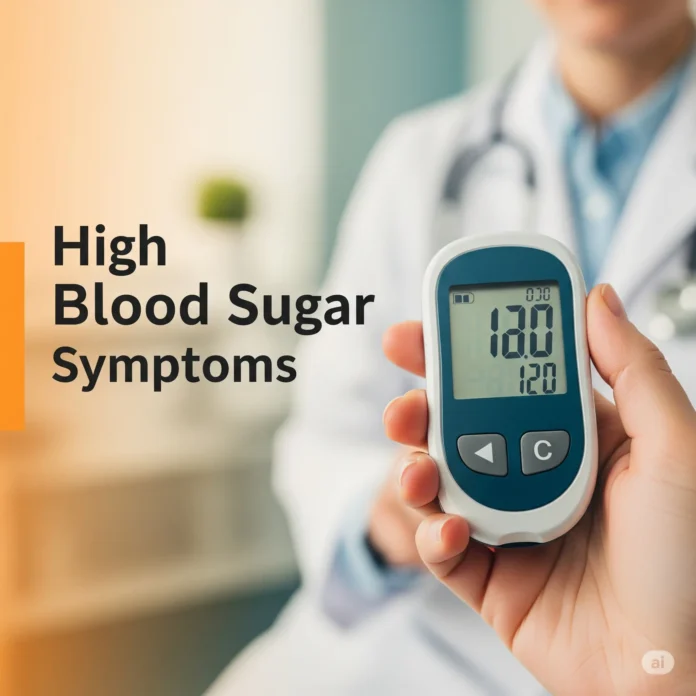Maintaining healthy blood sugar levels is essential for long-term wellness—and ignoring early signs of imbalance can lead to serious health consequences like diabetes. As processed and high-carb diets become more common, cases of elevated blood sugar are increasing around the world. But your body often gives subtle clues long before a diagnosis.
Let’s break down 16 critical signs of high blood sugar, followed by 8 clear symptoms of diabetes. Spotting these early might just save your health.
16 Alarming Signs of High Blood Sugar
- Frequent Nighttime Urination
- Waking often to urinate can mean blood sugar is affecting kidney function.
- Blurred Vision
- Temporary blurring happens when high glucose causes swelling in the eye lens.
- Difficulty Concentrating
- Glucose overload leads to fatigue and poor mental focus due to lack of cell energy.
- Dry Mouth
- Dehydration linked to high sugar levels can leave your mouth parched.
- Impotence
- Poor blood sugar control may damage nerves and vessels tied to sexual function.
- Recurring Infections
- High glucose compromises the immune system, welcoming frequent illness.
- Slow-Healing Wounds
- Poor circulation from elevated sugar delays skin repair processes.
- Digestive Issues
- Bloating, nausea, and delayed stomach emptying may be sugar-related.
- Constant Fatigue
- The body’s energy balance is thrown off when glucose isn’t absorbed properly.
- Excessive Thirst
- Kidneys require water to flush excess sugar, causing continual thirst.
- Dry, Itchy Skin
- Poor circulation leads to irritation, often in the legs.
- Unusual Hunger Patterns
- A lack of the hormone incretin results in fast-digesting meals—and constant cravings.
- Abdominal Weight Gain
- High sugar means less energy reaches cells, so the body stores it as fat.
- Nerve Pain or Damage
- Elevated glucose can injure nerves by disrupting nutrient flow.
- Skin Discoloration
- Thick, dark patches—especially on the neck or hands—may signal high sugar.
- Tingling or Numbness
- Known as neuropathy, this is a direct result of glucose-induced nerve damage.
8 Recognized Diabetes Symptoms
- Persistent Fatigue and Hunger
- When cells resist insulin, your body lacks energy—resulting in extreme tiredness.
- Excessive Urination
- Your body tries to expel excess glucose through frequent bathroom trips.
- Unexpected Weight Loss
- Sugar lost during urination equals calorie loss—and potential weight drop.
- Dry Mouth
- Dehydration from frequent urination may leave your mouth dry and uncomfortable.
- Blurred Vision
- Diabetes can damage blood vessels in the eyes and lead to long-term problems.
- Slow-Healing Cuts
- Wounds may linger due to compromised circulation and nerve sensitivity.
- Tingling in Hands & Feet
- A hallmark symptom of nerve damage from consistently high blood sugar.
- Dark Skin Patches
- Acanthosis nigricans, common on the neck or armpits, could be an early warning.
Why Early Detection Matters
According to the CDC, over 30 million people in the U.S. have diabetes, with millions more undiagnosed. An additional 33.9% have prediabetes. The problem? Early symptoms are often mild and go unnoticed—until the damage becomes irreversible.
Protect Your Health: What You Can Do Today
- ✅ Monitor your blood sugar regularly
- 🥗 Shift toward whole, unprocessed foods
- 🚶♂️ Incorporate daily movement
- 💧 Stay hydrated
- 📞 Talk to a healthcare provider if you notice any signs above
Your body knows when something’s off—are you listening?
If you’ve experienced these symptoms or simply want to take charge of your well-being, early action is key. Share this guide to raise awareness, and let’s normalize watching out for high blood sugar and diabetes symptoms before it’s too late.


